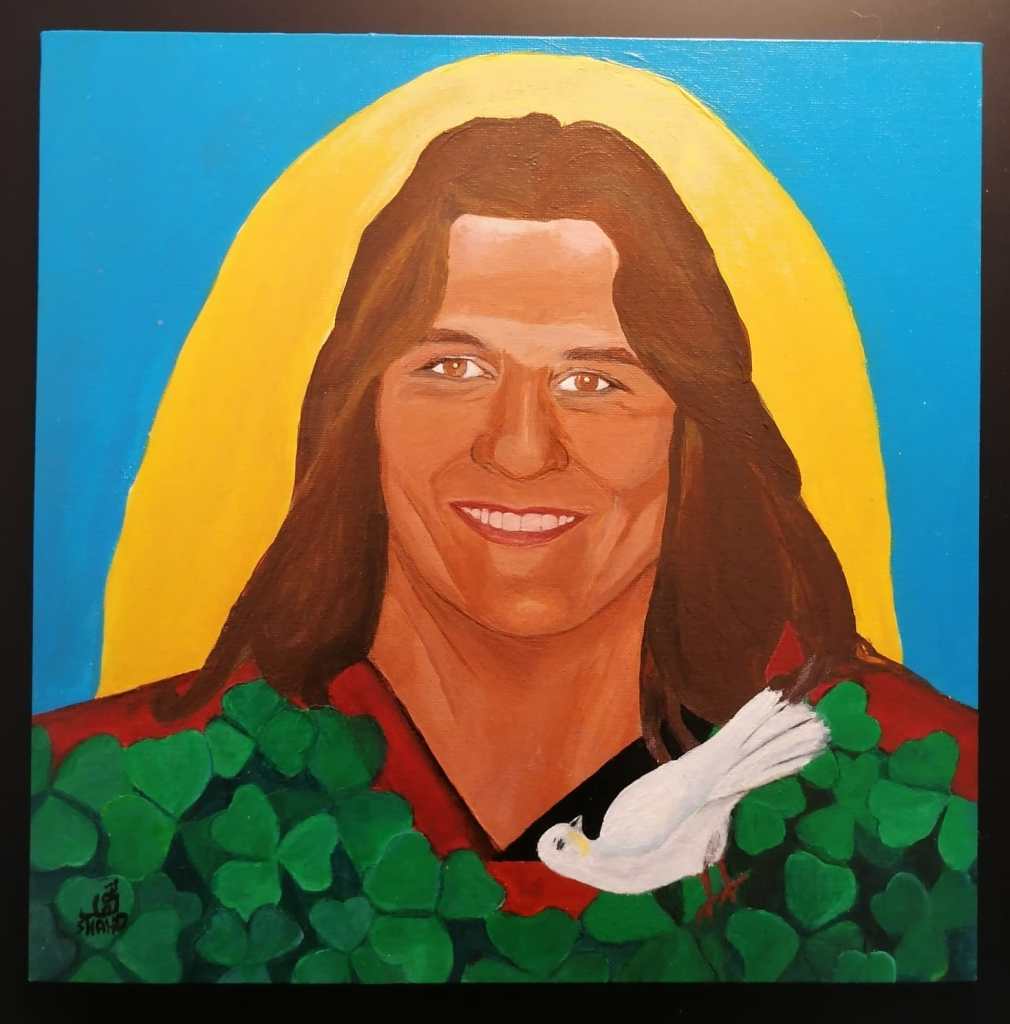Art Tribute: Remembering Bobby Sands and freedom fighters from Palestine to Ireland

On the 5th of May 1981, the Irish revolutionary Bobby Sands had a heroic death at the age of 27 after waging 66 days of hunger strike, the culmination of a 5-year protest that included the “dirty protests”, when Irish political prisoners resorted to smearing excrement on the walls of their cells in protest of prison officers’ repression and ill-treatment.
Many parallels could be drawn between the Palestinian and the Irish struggles for liberation. When I read Bobby Sand’s anthology “Skylark Sing Your Lonely Song” (1982), which accompanied my process of painting his portrait, my affinity with the Irish grew even stronger. We both lived under similar systems of oppression, the product of the British imperialism. We both resisted, to use his words, “an alien, oppressive, unwanted regime that refuses to withdraw from our land.” Sands rejected for the Irish to be treated like “ordinary” prisoners: “We are not criminals… unless the love of one’s people and country is a crime.” He fought the criminalisati on of the Irish people under British colonial rule, to be regarded as a political prisoner, a fight that my father Ismail and his comrades undertook in Israeli jails in the late 1960s and early 1970s.
The courage Bobby Sands and his comrades showed in British prisons resonated over Palestine. My dad was 19 when he was detained and sentenced to 7 lifetimes, each amounting to 99 years of imprisonment, a charge that promised him and many in his position death in jail. Instead of dwelling on this thought, like their Irish peers, they turned prison into a ground of freedom fight. In May 1980, he was counting his 9th year inside Israeli jails which to this day remains filled by thousands of wrongfully persecuted Palestinian men and women whose only crime is the love of their land and people. He was one of 80 Palestinian political prisoners who had been transferred to the then recently opened Nafha prison in the Naqab desert (Negev). Nafha had unbearable conditions, especially designed to break the spirit of prisoners, deemed as the “cream” of the Palestinian prisoners. The prisoners themselves feared that the success of this “disciplinary” action would mean that “all detainees’ achievements prior to 1980 were void” and would create a precedent to be applied to other Palestinians under detention. “So, from day one in Nafha prison, we realised that we had to prepare ourselves to counteract this oppression,” my father said.
Whenever Palestinian prisoners have gone on hunger strike, the Israeli prison authorities have responded by punishing them collectively and inhumanely. The Nafha strike was no exception. Detainees endured various methods of repression and torture, including solitary confinement and force-feeding. Rasem Halawa, Ali al-Jafari and Isaac Maragha were the Palestinian versions of Bobby Sands then; they died as a result of force-feeding in the prison’s clinic during the legendary Nafha mass hunger strike which lasted 33 days. This is only a snapshot into the fight of the free prisoners in Israeli jails, which witnessed the martyrdom of 227 Palestinians and the detention of a million since 1967 Israeli occupation.
My grandparents and their generation of the 1948 Nakba hoped for their children to have a better life, free from any foreign domination. The same with my parents and their generation who were born in refugee camps, like Sands, believed that ‘our revenge will be the laughter of our children.’ Their sacrifices were made to ensure that future generations will not endure such injustices, but the struggle continues, one generation after the other, facing a pariah state founded on settler-colonialism, occupation and apartheid, planted in Palestine by the British during their colonial rule on Palestine (1917-1948). To this day, the new state of Israel enjoys unprecedented international impunity under a world order that has been more invested in the material sustainability of Israel than achieving justice for the indigenous people of Palestine.
In this grim reality, the Irish people have continued to be unapologetically allies in our struggle against settler-colonialism, providing a source of hope for the Palestinian people as they constantly reaffirm their solidarity. When Bobby Sands and his comrades died in British prisons, Palestinian prisoners smuggled a solidarity letter to their bereaved families. In 2012, an Irish convoy came to Palestine as several Palestinian detainees were waging battles of hunger strikes in Israeli jails. I met them at Gaza’s branch of the ICRC where we used to gather with families of political prisoners, soon after the Jenin-born Hanaa Al-Shalabi was released and deported to Gaza after a heroic hunger strike against her unlawful administrative detention in Israeli jails, without charge or trial. Then, the families of Irish martyrs and hunger strikers sent back a solidarity letter with hunger striking Palestinian prisoners, and met Hana Shalabi as she was recovering on a hospital bed in Gaza and presented her with an easter Lily.
My painting joins many other tributes to show that Bobby Sands’ memory is still alive in the hearts and minds of many across the world. Sands was absorbed by flowers, birds, the sky and stars, which fed his free spirit in jail. To mark the 40th anniversary of the 1981 hunger strike, I painted his portrait with those symbols in mind, to celebrate his revolutionary legacy and the love, solidarity and freedom fights that binds the Palestinian and Irish people.
Tiocfaidh Ar La, for Palestine and Ireland

